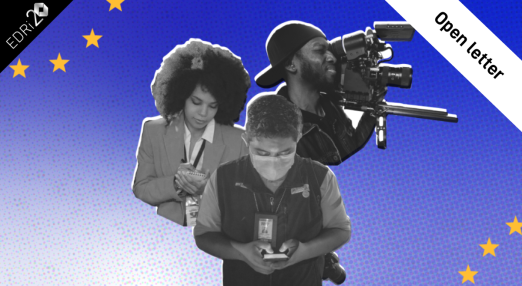Blogs
Filter by...
-

Open letter: Improvements to the enforcement of the General Data Protection Regulation
EDRi has signed an open letter organised by consumer and civil society organisations to welcome the intention of the European Commission to improve the enforcement of the General Data Protection Regulation. We call on the Commission to ensure that the draft Regulation improves the efficiency of enforcement and ensures data subjects can exercise their rights in a fair, effective, and affordable manner.
Read more
-

Open letter: The Council of European Union must protect journalists against spyware and surveillance in the European Media Freedom Act
Civil society and journalist associations are calling on the Council of the European Union to reconsider its current position on the European Media Freedom Act, as stated in a recent compromise text. Instead, the Council must take steps to meaningfully protect journalists and their fundamental rights.
Read more
-

Open Letter: Make vulnerability disclosure in the Cyber Resilience Act more secure, not less
The CRA would require organisations to disclose software vulnerabilities to government agencies within 24 hours of exploitation. However, such recently exploited vulnerabilities are unlikely to be mitigated within such a short time, leading to real-time databases of software with unmitigated vulnerabilities in the possession of potentially dozens of government agencies. Read the open letter.
Read more
-

EDRi-gram,14 June 2023
It’s getting hot in here – and we don’t just mean the weather. By the time this EDRi-gram reaches your inbox, the EU Parliament will have voted on the AI Act and the "e-Evidence" package. This is a crucial moment for the AI Act as we push hard and keep our fingers crossed for all the wins of the committee vote to remain after the plenary. We also have serious concerns about the e-Evidence proposal posing a threat to our fundamental rights. Along with other civil society groups, doctors and journalists organisations and internet service providers, we are calling on Members of European Parliament to reject this package. In this edition you can also read about what changed in the ten years since Snowden’s revelations about mass surveillance by the US government.
Read more
-

Snowden revelations: ten years on
Ten years ago, the first revelations about US mass surveillance were published in the UK and USA. The revelations swiftly widened to encompass details about the role of the UK’s GCHQ (Government Communications Headquarters) in the global gathering of vast amounts of communications data.
Read more
-

European citizens demand router freedom
A pan-European survey, run by the Free Software Foundation Europe, has collected information from more than 1600 end-users and highlighted several obstacles to Router Freedom, such as lack of freedom of choice, provider lock-in and promotion of equipment running exclusively proprietary software.
Read more
-

Europol data deals with violent police forces need “strong data protection safeguards”
Proposed data-sharing deals between Europol and five states in Central and South America needs explicit safeguards if they are to uphold fundamental rights, the European Data Protection Supervisor said at the beginning of May. Police forces in those states have brutal records of violence and torture.
Read more
-

Bits of Freedom monthly update on human rights & tech: April 2023
Read through the most interesting developments at the intersection of human rights and technology from the Netherlands. This is the fourth update in this series.
Read more
-

The Belgian government is failing to consider human rights in CSA Regulation
Despite the clear warnings, Belgium has taken a position calling on the EU to adopt the CSA regulation as quickly as possible, dismissing the technical problems, and without addressing the serious legal concerns that have been raised.
Read more
-

Open letter: e-Evidence package lacks appropriate safeguards, EU Parliament must reject it
Civil society, doctors, lawyers and journalists associations and internet service providers are calling on MEPs to reject the so-called “e-Evidence” package during the plenary vote on June 13 because the proposed system of cross-border access to data in criminal matters would severely undermine fundamental rights.
Read more
-

Commission launches internet fee consultation full of biased questions
The European Commission has launched an “exploratory questionnaire” about telecom corporations wishing to levy an internet fee from online content providers. EDRi’s response outlines why that’s a ludicrous idea, a threat to net neutrality, and bad news for all internet users.
Read more
-

Will the European Union allow politicians to use your personal data for political advertising?
A leak by POLITICO revealed that the European Commission presented three scenarios on how the Political ads regulation will impact the processing of special categories of personal data such as sexual orientation, religion or mental health.
Read more
